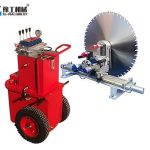Portable mini concrete pump is a compact, lightweight, and highly mobile device designed to transport concrete over both short and long distances, both horizontally and vertically. Unlike traditional concrete pumps, which are often large, cumbersome, and require extensive setup, the mini concrete pump offers unparalleled flexibility and ease of use.
Features of Portable Mini Concrete Pump
1. Compact and lightweight design
One of the most striking features of the portable concrete pump is its compact size and lightweight construction.
2. High performance and productivity
Despite its small size, the small concrete pump delivers impressive performance.
3. Versatile applications
The portable mini concrete pump is suitable for a wide range of construction applications. It can be used for masonry block filling, wall grouting, hoisting mortar for masonry wall construction, concrete sidewalk, and patio slab pumping.
Applications of Mini Concrete Pumps
The adaptability of small concrete pumps makes them suitable for a wide range of projects:
1. Residential construction
From foundations and driveways to swimming pools and patios, mini pumps streamline concrete placement in homes. Their compact size minimizes disruption to existing structures and landscapes.
2. Commercial renovations
In urban settings, where space is limited, these pumps excel in tasks like floor leveling, stairwell construction, or adding concrete slabs to retail spaces.
3. Agricultural infrastructure
Farmers use mini pumps to build silos, irrigation channels, and livestock shelters efficiently. The equipment’s mobility is especially valuable in remote rural areas.
4. Landscaping and hardscaping
Creating garden pathways, retaining walls, or decorative concrete features becomes effortless with precise pumping control.
Benefits of Using a Small Concrete Pump
1. Enhanced accessibility
Traditional concrete trucks and pumps can struggle to access certain job sites, especially in urban or rural environments with limited space. Portable mini concrete pumps solve this problem by offering unmatched flexibility and mobility.
2. Reduced labor costs
Because the pump can deliver concrete directly to the placement area, it minimizes the need for manual handling. This reduces labor costs and improves on-site safety by decreasing the risk of injuries related to heavy lifting.
3. Time-saving efficiency
These pumps drastically cut down on the time needed to pour concrete. This allows contractors to complete projects faster, take on more jobs, and improve overall productivity.



